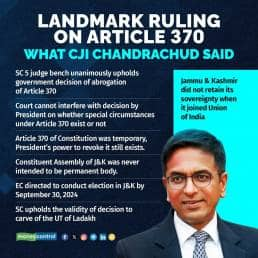



The Supreme Court on December 11 upheld the validity of the Presidential order scrapping Article 370 of the Constitution which gave special status to Jammu and Kashmir and the bifurcation of the state, saying it didn’t retain an element of sovereignty after accession to India.
The Chief Justice of India DY Chandrachud-led constitutional bench also said that Article 370 was a temporary provision, upholding the government’s contention to scrap the provision that allowed the state to have a flag and a separate constitution. The five-judge bench was led by DY Chandrachud and comprises Justices SK Kaul, Sanjiv Khanna, BR Gavai and Surya Kant.
The court said the bifurcation of the state into union territories of Jammu and Kashmir and Ladakh was valid but ordered restoration of J&K’s statehood at the earliest. It also directed the Election Commission to hold polls in J&K by September 30.
The bench was headed by Chief Justice of India DY Chandrachud and comprised Justices Sanjay Kishan Kaul, Sanjiv Khanna, BR Gavai and Surya Kant. "It (SC) doesnt need to adjudicate on validity of proclamations because main challenge was to abrogation and if it can be done during president rule and even if its held proclamation could not be done, no material to say president rule cannot be invoked," stated the bench.
The court also refused to rule on the validity of the Presidential rule imposed in Jammu and Kashmir in Dec 2018. CJI Chandrachud noted, "Every decision taken by Union on behalf of State during Presidential rule not open to challenge...this will lead to the administration of state to a standstill."

The constitution bench said that Jammu and Kashmir constituent assembly was never intended to be a permanent and its recommendations were not binding on the President. "When the J&K constituent assembly ceased to exist, the special conditions for which Article 370 was introduced also ceased to exist but the provision had continued due to the situation in the state," the CJI said.
The court said it didn’t decide on the validity of J&K Reorganisation Act, 2019, as the Solicitor General had submitted that J&K’s UT status was temporary and the statehood would be restored. It upheld the move to make Ladakh a union territory.
-President of India has the powers to abrogate Article 370. The constituent assembly of J&K was a temporary body.
-Slew of presidential orders indicate the Union and the state have integrated with the Union over 70 years. The continuous exercise of power by president only indicates that the gradual process of constitutional integration was ongoing for over 70 years.
- The petitioners did not challenged the proclamation under Article 356 hence need not be adjudicated.
- Exercise of power by the president can be challenged however the person challenging it must show it was done in bad faith.
The five-judge bench is led by Chief Justice of India DY Chandrachud and comprises Justices SK Kaul, Sanjiv Khanna, BR Gavai and Surya Kant.
The petitioners who had challenged the abrogation were represented by senior advocates Kapil Sibal, Gopal Subramanium, Rajeev Dhavan, Zaffar Shah, and Dushyant Dave, among others. The parties who were in support of the abrogation were represented by Attorney General R Venkataramani, Solicitor General Tushar Mehta, senior advocates Harish Salve, Rakesh Dwivedi, V Giri and others.
Discover the latest Business News, Sensex, and Nifty updates. Obtain Personal Finance insights, tax queries, and expert opinions on Moneycontrol or download the Moneycontrol App to stay updated!
Find the best of Al News in one place, specially curated for you every weekend.
Stay on top of the latest tech trends and biggest startup news.